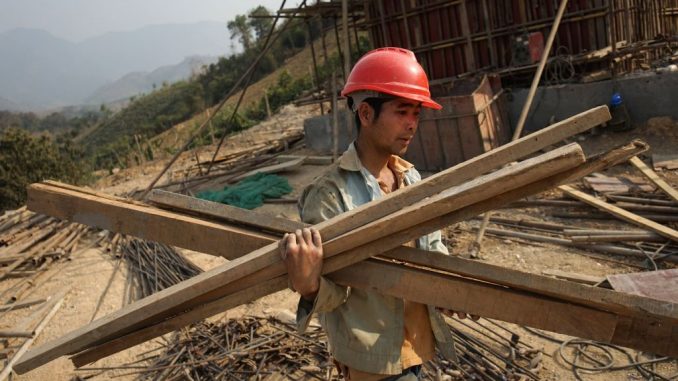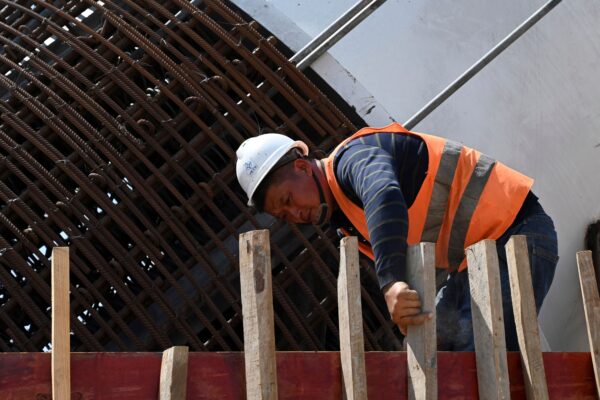
Chinese migrants signed on to work for the CCP’s (Chinese Communist Party’s) Belt and Road Initiative (BRI) with hopes of earning a good wage and sending support to their families back in China. Instead, they got stranded in several countries due to the COVID-19 pandemic and have been subjected to a number of human rights violations with no possible recourse in sight.
According to a report (pdf) by New York-based China Labor Watch (CLW), state-owned companies overseas curtailed Chinese migrant workers’ ability to travel during the pandemic and denied them medical treatment. Flights were hard to get and prohibitively expensive due to the Chinese regime’s limit on international flights coming into the country and workers were threatened if they tried to leave.
A Victim’s Story
CLW conducted several interviews with Chinese laborers working in various overseas BRI projects. One worker at an oil shale-fired power plant in Jordan said they were not provided with any personal protective equipment when the CCP virus broke out. According to a worker, known as “Victim A” in the report, it was only after an inspection by Jordanian government officials that they were provided with one mask per week.
For weeks after the project ended in April 2020, Victim A and other workers went to the Chinese Embassy in Jordan to protest and demand their right to return home. Chinese police contacted Victim A’s family and warned that if he continued to protest, his name would be “put on a blacklist and never be permitted to enter China again.”
Nonetheless, he had no choice but to persist. He was left with no income or savings after only being paid for his first six days of work, despite working for five months. Victim A and other workers had pled with upper Chinese staff in the project office to help them return to China, but the staff responded with warnings of having them arrested for lack of working visas, and had local security guards expel them from the premises.
After four months of protesting in front of the embassy, the workers were finally put on a charter flight and returned to China in mid-August. But more than 300 Chinese workers were still stranded in the same worksite of the Attarat power plant when they left.
For fear of retribution, Victim A told his story on the condition of anonymity. The CLW’s report contains 22 Chinese workers’ experiences on BRI projects in Indonesia, Algeria, Singapore, Jordan, Pakistan, Serbia, and other countries. Most of them concealed their identities.
The BRI Idea
The CCP’s flagship BRI project is a multi-trillion-dollar infrastructure scheme that seeks to increase the CCP’s influence through global trade links while generating income for China through a finance mechanism that invests in infrastructure-based development.
First announced in 2013, the BRI idea eventually led to the CCP securing 205 signed cooperation agreements with 140 countries and 31 international organizations by Jan. 20, 2021.
All of the BRI projects are financed through Chinese state-controlled lenders.
For example, the $2.1 billion oil shale-fired power plant in Jordan is supported by a $1.6 billion debt with the Bank of China and the Industrial and Commercial Bank of China. Seventy percent of the equipment was imported from China, valued at more than $540 million. China’s Guangdong Power Engineering Corp. led the engineering, procurement, and construction of the plant under a turnkey contract.
Chinese Laborers Experience the Same Transgressions
Victim A’s experience in Jordan is not unlike the stories described by several other migrant Chinese workers on BRI projects. They typically enter a country with a tourist or business visa, and their passports are immediately seized upon arrival. The compound where they work and live is generally in an isolated field, and they are forced to work extremely long hours.
Victim A was introduced to the job by a friend of his father. Lured by the good pay and a fair contract, he went to Jordan in December 2019.
His passport was taken away as soon as he got off the plane, and he was told there was no contract. If Victim A wanted to leave, he would have to pay a $1,240 penalty plus an expensive ticket for a return flight. Unable to afford the fine, he stayed on with the deceptive employer.

None of the workers received proper medical treatment for injuries. According to the report, one worker died in the dormitory without treatment after being infected with the CCP virus. His body was only found two days after his death. Most of them did not receive the promised salary, and some could not afford the living expenses while working. Some workers said they were detained and beaten by security guards if they argued with management or attempted to strike.
Therefore, not many sought help.
Fear of Reprisal
Workers were reluctant to tell their experiences to the CLW for fear of the CCP’s surveillance on their phones.
The report revealed that when one worker who had been stranded in Indonesia went through Chinese customs, the inspectors stopped him and checked his WeChat—China’s most popular multi-purpose social media app.
“He was wary of asking too many questions about the situation of other workers in the WeChat group, and he was careful about complaining too much because he had no way to know who was reading the group chat messages,” said the report.
The report pointed out that they could be “accused and suspected of ‘violating national laws and endangering the national security of the People’s Republic of China,’” a typical charge for dissidents in China.
According to China’s Ministry of Commerce, the number of overseas Chinese workers reached 992,000 at the end of 2019. The actual number should be triple that, at least 3 million, Li Qiang, the director of CLW told Radio Free Asia.
“How could the Chinese regime take benefits to other countries when it does not care about its own people?” Li questioned, “the narrative is they [the workers] don’t want to return home, but many of them, as far as we know, are all eager to return to their home country. Many of them have not been able to return home for three years.”






Be the first to comment